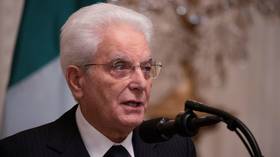Canceling Russian culture is a mistake – Italian president


Russian culture is an inseparable part of European history, Italian President Sergio Mattarella said in an interview with Corriere Della Sera on Friday. The leader condemned the recent attempts to cancel Russian works of art amid Moscow’s conflict with Kiev.
Asked if it is “right to abolish” Russian literature and art from Europe’s long cultural history, Mattarella stated that the ‘cancel culture’ against everything Russian is a mistake.
“The attitude towards the cultures produced by man, by the most diverse intellectuals and artists, can only be openness, curiosity, knowledge, comparison,” he said.
Progress comes from this. Not from rejection, not from cancelation.
“The cancel culture towards Russian literature and art is a mistaken gesture,” the president said, adding that Russian culture is an inseparable part of European history.
Mattarella stressed that culture does not lend itself to “convenient cataloging,” and aspires to offer itself as a vision that contrasts with the real world. “What kills culture is homogenization, conformity, even that to which we submit unconsciously or culpably due to mental laziness, due to opportunism,” he said.
Ever since Russia launched its military operation in Ukraine in February 2022, there have been numerous calls and attempts in the West to boycott any and all Russian art in retaliation. Many Western cultural institutions have sought to completely remove Russian-linked works from their galleries and opera houses.
The Cardiff Philharmonic Orchestra in Wales dropped the music of composer Pyotr Tchaikovsky from a concert, Britain’s Royal Opera House canceled a tour by the Bolshoi Ballet, and New York’s Carnegie Hall and Metropolitan Opera have stopped allowing Russian musicians and organizations to perform at their venues.
The clampdown, which has been actively encouraged by Kiev, has affected Russian musicians, filmmakers, artists, and athletes, many of whom have been banned from performing or competing in the West, as well as being allowed access to Western markets.
President Vladimir Putin slammed the reprisals against Russian artists and works last year while speaking at the Valdai Discussion Club forum, and suggested that it is reminiscent of the Nazi book burnings.